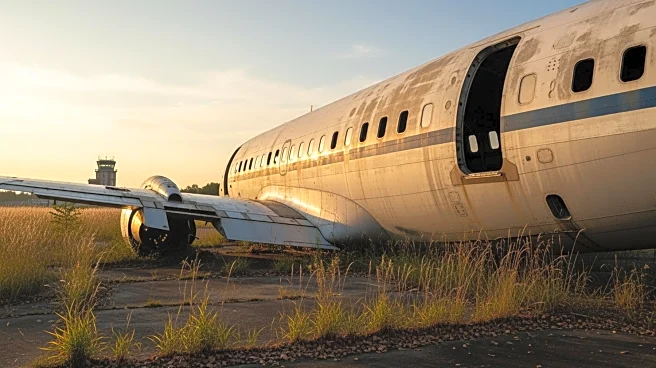What's Happening?
Air India has sold a 43-year-old Boeing 737-200 that had been forgotten at Kolkata Airport for 13 years. The aircraft, with registration code VT-EHH, was initially delivered in 1982 and served as a passenger jet for Indian Airlines before being leased
to Alliance Air in 1998. It returned to Indian Airlines in 2007 and was converted into a freighter for Air India Cargo, operating flights for Indian Post. After being parked at Kolkata Airport in 2012, the plane was overlooked until recently when the airport requested its removal. Air India CEO Campbell Wilson shared this unusual story with employees, highlighting the oversight and subsequent sale of the aircraft.
Why It's Important?
The sale of the forgotten Boeing 737 highlights the complexities and challenges in managing large fleets, especially during transitions such as privatization. This incident underscores the importance of meticulous asset management within airlines, which can prevent costly oversights. For Air India, the disposal of the aircraft represents a step in clearing outdated assets, potentially improving operational efficiency. The story also serves as a reminder to other airlines about the importance of maintaining accurate records and inventory management to avoid similar situations.
What's Next?
Following the sale, Air India may review its asset management practices to prevent future oversights. The airline could implement stricter inventory controls and audits to ensure all assets are accounted for. Additionally, the aviation industry might see increased scrutiny on asset management practices, prompting other airlines to reassess their procedures. Stakeholders, including airport authorities, may also become more vigilant in monitoring parked aircraft to avoid prolonged storage without resolution.
Beyond the Headlines
This incident raises questions about the accountability and transparency in asset management within the aviation industry. It highlights potential gaps in communication between airlines and airport authorities, which could lead to inefficiencies. The story also reflects broader challenges faced by airlines during mergers and privatizations, where asset tracking can become complicated. Long-term, this could influence industry standards for asset management and prompt regulatory bodies to enforce stricter guidelines.
















